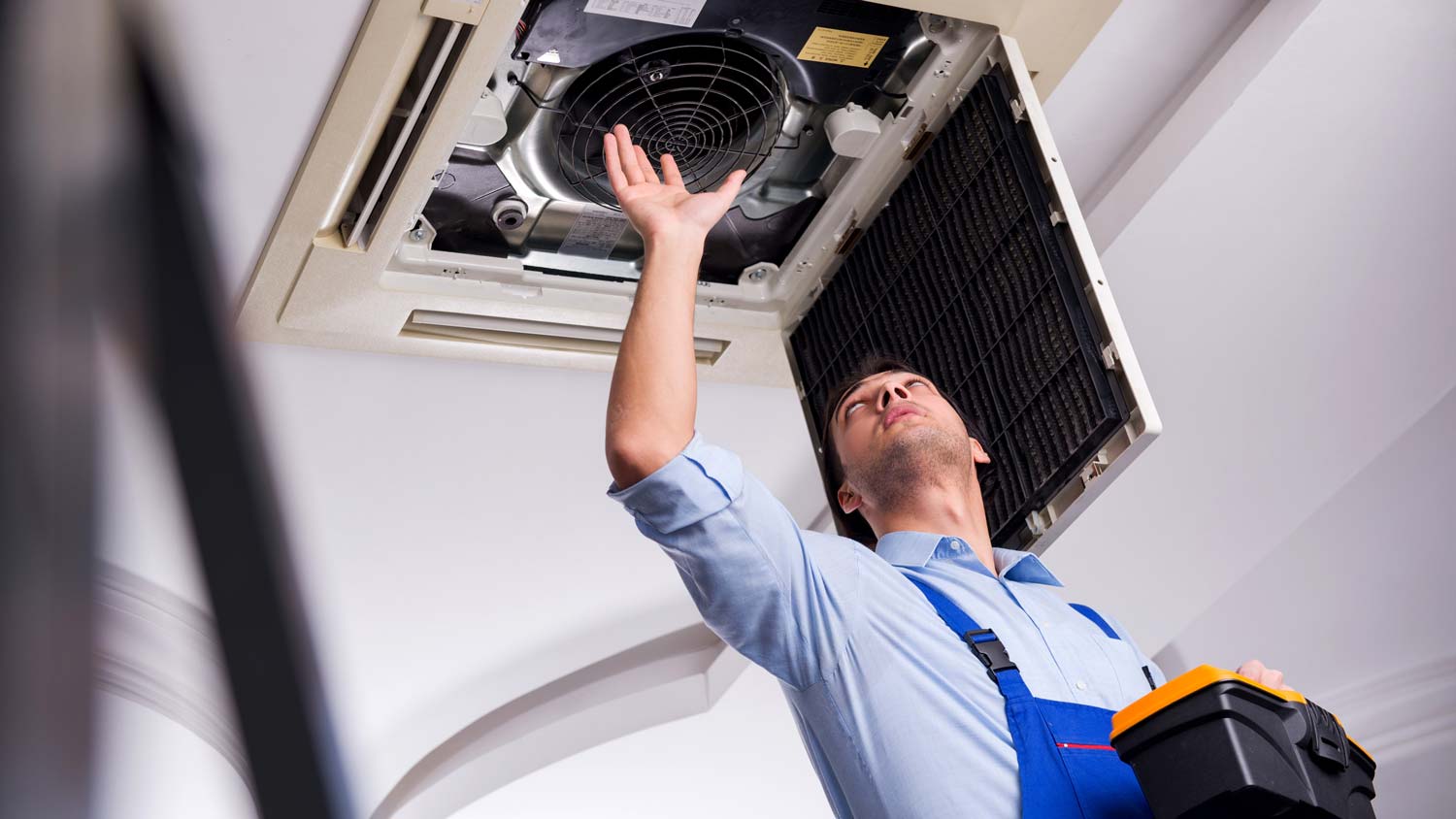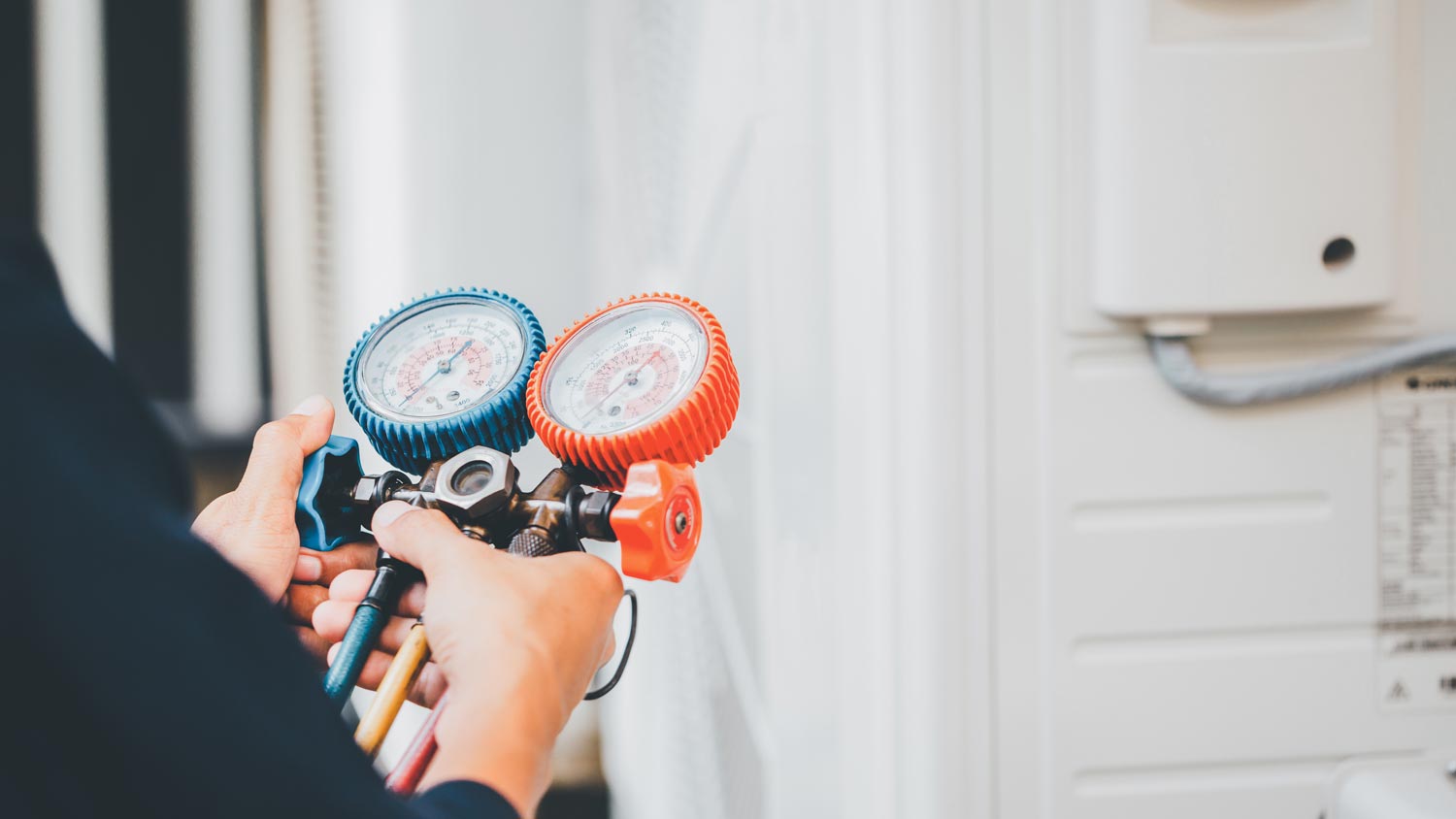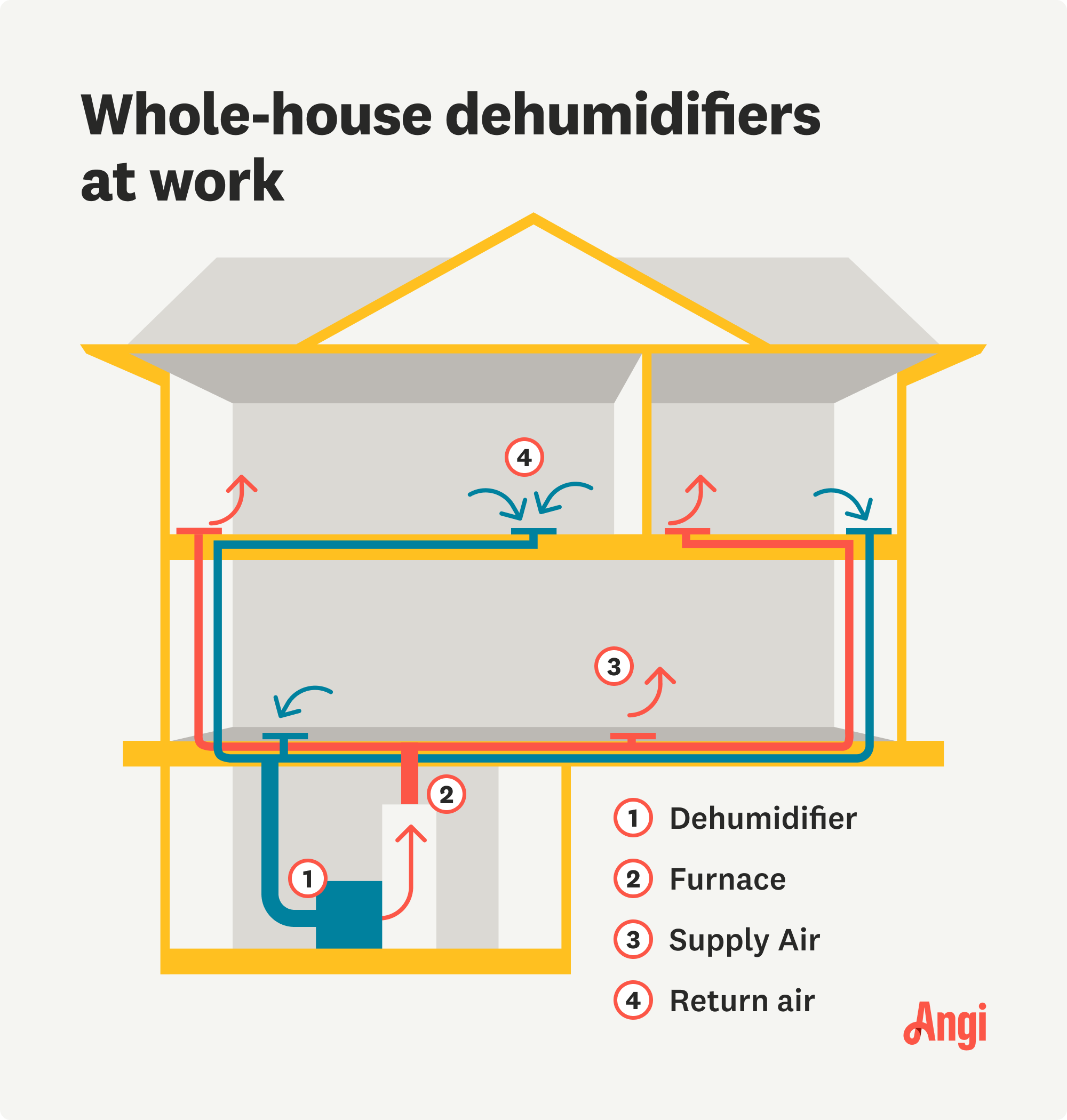
A blower door test can identify air leaks in your home and help boost energy efficiency. Use this blower door test cost guide to see what your test will total.
Does your AC unit have life left in it or is it past its prime?


If your air conditioning unit is rattling, blowing warm air, or leaking, you’re probably wondering if it’s worth it to repair it or if it’s time for a replacement. But how long does an AC unit last?
Older AC units might still work well after a minor repair, but most of the time, a replacement for a newer, more efficient AC unit is worth it in the long run. To better understand whether you should repair or replace your current AC unit, keep in mind how long an AC unit lasts.
Most AC units last about 10 to 20 years on average. However, it can depend on the type of AC unit you have, and how well you take care of it.
| Type of AC Unit | Lifespan in Years |
|---|---|
| Portable AC | 5–10 |
| Window unit | 8–10 |
| Ductless mini-split | 10–20 |
| Central AC | 12–17 |
| Evaporative cooler | 15–20 |
| Geothermal | 15–25 |
A central AC unit lasts about 12 to 17 years, accounting for a normal amount of usage, regular inspections, and maintenance.
As for window AC units, these small powerhouses last about 8 to 10 years on average. High-efficiency models, whether central or window, tend to provide a longer lifespan while using AC units extensively can shorten the life of an AC unit.

Check out these telltale signs to look for when considering whether to repair or replace your air conditioner.
Do you feel like you’re dusting way more than usual? If you’ve replaced your air filters and still find a constant layer of dust around the house, it may mean your AC unit isn’t working properly and needs replacement. The excess dust can also put more strain on the AC unit.
If your AC unit is more than 10 years old and starting to slow down, it’s likely time to consider a replacement. Newer models are designed to be more efficient and use more sustainable refrigerants compared to older AC units. Plus, the cost of repairing older models may not be worth the investment, especially if parts become harder to find over time.
While energy bills can fluctuate, especially depending on the season, an abnormally high price on your monthly bill should raise a red flag. This could be a sign that the AC unit isn’t running efficiently due to age or worn-down parts.
If you smell smoke or an earthy, mildew smell when the AC unit kicks on, that’s a major red flag. You’ll want to address any foul smells coming from the AC unit immediately since this is a sign of major issues, such as electrical malfunctions or mold growth.
A leak isn’t always a sign of a replacement, as this common window AC problem may only signal a misaligned drain pan. But it could be time to replace the AC unit if you notice excessive leaking or a buildup of moisture from water or refrigerant. The excess moisture can lead to mold growth or cause structural damage to your home.

Aside from the quality of the AC unit, which depends on the make and model, several factors can shorten or lengthen the lifespan of an AC unit.
Do you let your AC unit run constantly, or do you have it set to run only when the household temperature passes the set threshold? Like any household appliance or device, the more you use it, the faster it will wear down.
You can help extend the lifespan of an AC unit by using it only as needed. When temperatures are a little warm but not scorching hot, you might consider opening windows or setting up fans to get some cooler air moving without relying as much on the AC. You can also invest in a smart thermostat that you can program to regulate your home’s temperature, saving about 10% to 12% in heating usage.
It’s all about location, location, location. Living in a warm climate means you’ll need to run the AC more often, which can shorten the unit’s lifespan. On the other hand, AC units in dry climates can accumulate more dust, which inhibits their performance.
Then, there’s the matter of where the AC unit is installed. An outdoor AC unit or window AC unit near bushes or tall plants may not work as well as an AC unit in a clear area. Make sure to trim your hedges and create an open space around the AC unit to help it run efficiently and extend its lifespan.

Your home’s air quality can affect the longevity of your AC unit. For example, salty air in coastal environments can wear down the AC unit condensing coil. Poor air quality filled with pollutants can accumulate in the AC unit and trap moisture, leading to mold.
Humidity is another concern since humidity over 50% can cause moisture accumulation in the AC unit. You may want to use a dehumidifier along with the AC unit for optimal cooling and to extend your AC unit’s lifespan.
Proper installation is an important factor for AC longevity. Hire an HVAC specialist near you to ensure the air conditioning system is properly installed. If you install it yourself and there’s an issue—like the refrigerant pipes are too long or the ducts aren’t sealed properly—the system won’t work efficiently. Improper installation can lead to strain or overheating of AC unit parts, and any mishandled wires can increase the risk of electrocution or fire.
In addition to proper installation, regular maintenance is one of the most important ways to extend the life of an AC unit. You should professionally service your AC unit every year to keep it in working order and identify any issues before they become more serious.
An annual AC tune-up can extend the life of your AC unit by several years. Plus, the increased efficiency can save you 15% on your monthly energy bills.

While your AC system won’t last forever, there are some things you (or a pro) can do to make sure the cooling system stays, well, cool for as long as possible.
When it comes to maintaining an air conditioning unit, there are tasks that you can handle yourself in addition to some regular check-ups that you can hire a pro to do for you.
Change the air filter: Homeowners should change their AC filters every one to three months.
Clean the coils: Cleaning AC coils is a challenging task best left to more experienced DIYers or an AC repair pro. Regular coil cleaning can prevent the coils from freezing.
Clean the thermostat: At least twice per year, make sure to not only wipe down the outside of the thermostat but also dust the interior.
Clear debris from the outdoor unit: If you have an outdoor AC unit, make sure to clear away twigs, leaves, and other debris that can damage the unit.
Schedule an inspection: At least once per year, an AC expert should come to inspect the entire system for any air leaks, low refrigerant, or other common AC problems.
Fortunately, with regular inspections, a pro will catch any problems with the AC unit early on. The quicker you notice a clogged drain line or damaged fan, the sooner a pro can repair or replace the parts. If you let AC problems drag on for too long, they can cause the AC to freeze or leak, which will cost you more time and money to fix.
You want your AC system to work smarter, not harder. You can help reduce wear and tear on the system by insulating your home so that no cool air escapes. Seal gaps around windows or doors or switch to energy-efficient windows if you’re looking for window replacements. You can even insulate your home’s outlets to make sure every small opening is tightly sealed.
Air conditioning systems often include a warranty that can range from one year to as many as 12 years. The warranty depends on what brand AC you purchase, where you buy it from, and whether or not you pay for an upgraded warranty.
Warranties for air conditioners are good for five to 10 years on average and cover certain defective parts, although an extended warranty is more likely to cover the more expensive parts to replace, like an AC compressor. A warranty may cover the cost of new parts, but only some warranties cover the cost of labor, too.
You need to register your product within a certain timeframe—often 60 or 90 days—from installation to activate the warranty. Also, some warranties will become void if you attempt to install or repair the AC unit yourself, so make sure you hire a pro for repairs if this is a clause in your system’s warranty.
From average costs to expert advice, get all the answers you need to get your job done.

A blower door test can identify air leaks in your home and help boost energy efficiency. Use this blower door test cost guide to see what your test will total.

A faulty evaporator coil is a common cause of AC failure. But how much does an evaporator coil replacement cost? We explore the factors here.

Regularly replacing your HVAC filter regularly is vital for a healthy system. Learn how much an HVAC filter replacement costs with this informative guide.

Baseboard heater covers can endure a lot of wear and tear, but eventually you’ll want to replace them. Here’s the best way to switch out baseboard heater covers.

Not sure who to hire to install radiant floor heating? Learn which pros handle radiant floor heating installation and how the work comes together.
How to clean your air conditioner depends on the unit type. Sometimes, a good hose-down is all you need if you have centralized AC. This guide can help with the cleaning process.